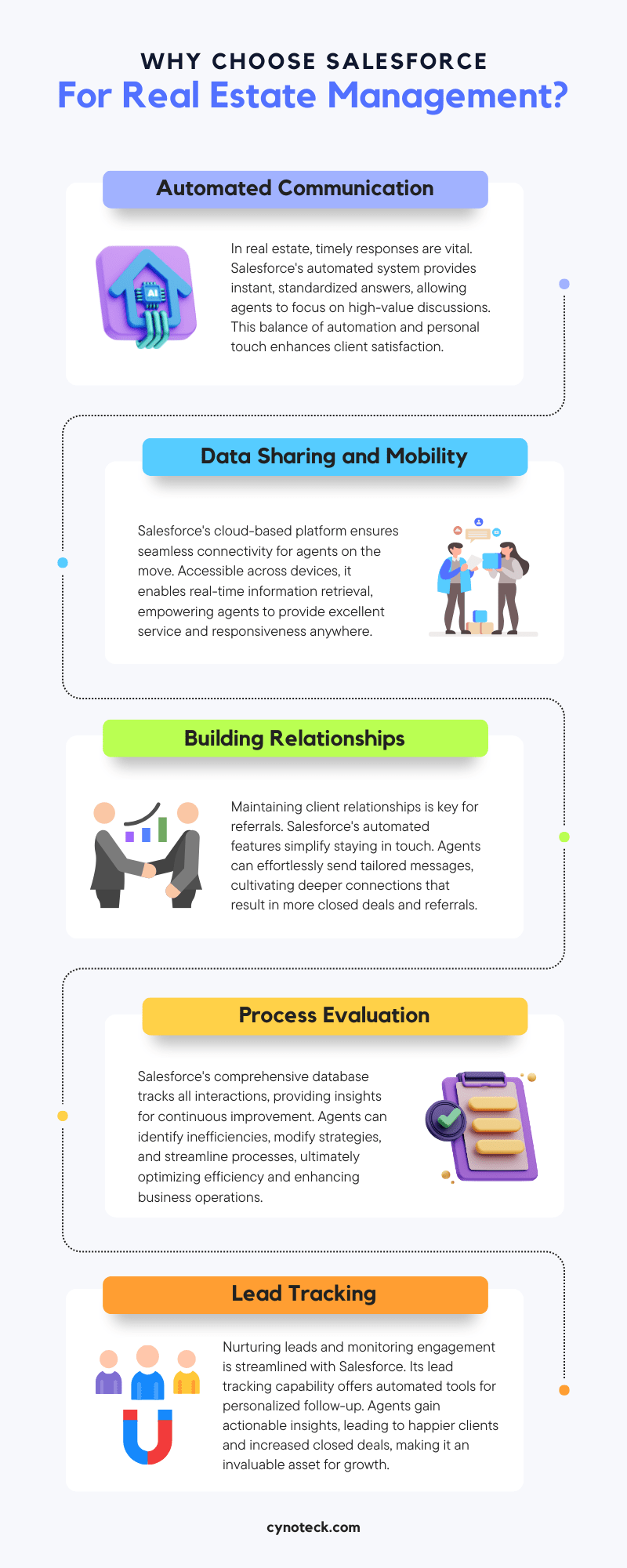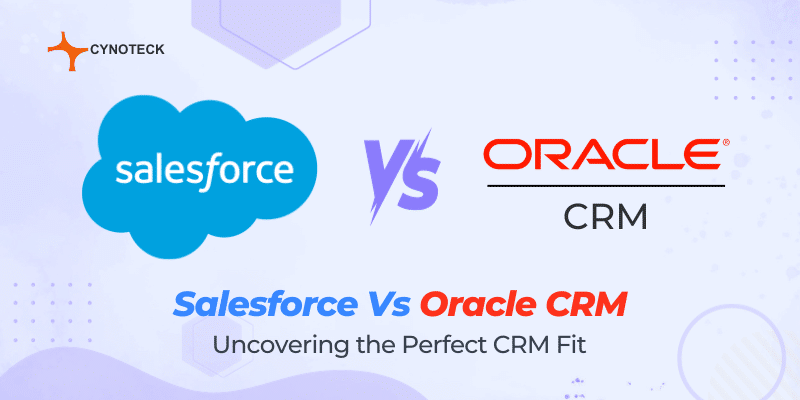The real estate industry has unique needs when it comes to customer relationship management (CRM) software. From keeping track of listings to managing client communications and relationships over years or decades – real estate calls for specialized CRM capabilities.
Good CRM software can make a realtor up to 100% more productive.
While Salesforce is better known in industries like technology, manufacturing, and financial services, it offers powerful functionalities tailored for real estate as well. Yes! With the right combination of tools and customization, Salesforce can become the command center for real estate agencies and brokerages.
Real estate companies investing in Salesforce can see about a 27% increment in sales revenue and around a 32% rise in lead conversion rates.
If you are wondering how Salesforce can accelerate growth in the real estate market, we are here to help you. We will look at the reasons why Salesforce is emerging as an incredibly useful platform across various real estate scenarios.
Also, we will share how top-tier agencies leverage Salesforce to organize complex sales pipelines, gain insights, and deliver superb customer experiences. By demonstrating diverse applications and tangible benefits, we aim to inspire more brokerages and realtors to evaluate how Salesforce can transform their business. Now let us get started:
What is Real Estate Management Software?
Real Estate Management is an established concept in the real estate industry. For as long as rental housing has been around, managers have tracked relevant data about units and tenants. However, modern technologies are allowing contemporary property managers to provide services at an advanced level.
Salesforce holds about 19.8% to 20% of the global CRM market share, making it the leading CRM software solution globally.
Modern real estate management platforms incorporate customer relationship management (CRM) capabilities that facilitate strong connections between managers and renters. This technology, specialized for the rental sphere, empowers property managers to offer a high degree of personalized service vital for cultivating long-lasting tenant relationships.
It eases out vast amounts of data that property managers must deal with while making sure to give the best assistance to customers.
Current software brings a customer-focused, user-friendly approach to real estate management. By leveraging CRM features designed specifically for rental housing needs, innovative tools are transforming old-fashioned tenant-manager dynamics into modern partnerships built on understanding and communication.
Also, read: Salesforce security: the guide to keeping your business and customer data safe
What should you look for in a Real Estate Management Solution?
Selecting real estate management platforms requires careful evaluation, as the software landscape provides options of varying quality. Focusing on certain key capabilities will guide you toward the most effective tools.
An essential feature of contemporary solutions is full cloud-based architecture. In the past, housing data existed on in-house systems with limited accessibility. Cloud computing introduced centralized, mobile data storage. Now, authorized users can securely access real-time information anytime, anywhere via internet browsers.
Cloud systems furnish additional advantages beyond erasing location restrictions. They minimize hardware expenses and maintenance responsibilities by handling those duties. Streamlined data sharing also enables smoother teamwork through company-wide transparency on current figures and tenant records.
Transitioning fully to the cloud may once have seemed an ambitious move. Yet thinking progressively, it has become a vital step for property managers toward heightening access and collaboration while controlling costs. Prioritizing this functionality helps position organizations to derive maximum value from their real estate management software selection.
The international real estate software market size is expected to reach USD 90 billion by 2028, adding another 25+% to the real estate CRM revenue share.
Real Estate Management Software demands reliable data security
Renting necessitates sharing sensitive personal information, so tenants have much at stake regarding data security. Any breaches through damage, loss, or theft could compromise more than the tenant-manager relationship. Cloud platforms significantly mitigate such hazards.
Centralized cloud databases prevent files from being misplaced or destroyed on-site. Localized threats like fires or floods which may ravage on-premises servers will not affect remote cloud data.
Furthermore, reputable providers implement rigorous multi-layered security precautions like authentication, access controls, and encryption to protect against theft.
Even in rare cases of corruption, advanced data recovery methods mean no information stays lost indefinitely. So, while tenants share details in good faith during rental agreements, managers have an ethical obligation to secure those details responsibly. Cloud systems better uphold that duty through enhanced safety infrastructure compared to vulnerable local set-ups.
Prioritizing state-of-the-art security fortifies trust in the tenant-manager dynamic. With cloud solutions minimizing the predominant data hazards, tenants can feel more assured that their personal information remains protected.
Real Estate Management Software should make it easy for tenants to reach out
Effective real estate management prioritizes strong tenant relationships, with the ideal goal of making each renter feel valued individually. Like any partnership, these connections depend on transparent, responsive communication. Cloud-based platforms optimize manager-tenant interactions.
Leading solutions have integrated tenant portals for direct access to updates, discussions, and support. With personal logins, renters can track relevant information, express concerns, or connect with wider tenant communities. Critically, robust tools incorporate multiple contact methods to suit different preferences.
Whether emails, phone calls, live chats, or other channels, comprehensive platforms unite every avenue within a single interface. This consolidation of streams enables managers to coordinate organized, omnichannel responses. Communication is interdependent, so software that complicates tenant contact risks impairs relations.
By centralizing all outreach methods into a unified dashboard, modern cloud-based systems empower responsive, tailored engagement. Managers can nurture each tenant relationship by facilitating their preferred contact strategies through this integrated approach. Prioritizing these communication capacities accelerates fruitful partnerships.
Real Estate Management Software should feature built-in analytics:
While access to data is invaluable, property managers realize true value by applying insights extracted from analytics tools. Manually going through endless data points to locate useful patterns simply exceeds most organizations’ capabilities. Integrated analytics functionality handles this efficiently.
Purpose-built real estate solutions can automatically process ample information to highlight influential trends, behaviors, and projections. At the push of a button, managers generate on-demand reports forecasting marketing shifts, measuring tenant actions, and more. By surfacing precise insights from complex data, embedded analytics confer confidence for decisive action.
Additionally, advanced automation further unburdens managers by handling repetitive tasks. Traditional automation has limits, but newer AI adoption elevates capabilities.
Advanced machine learning algorithms can mimic functions like building tailored tenant emails, flagging priorities, and identifying correlations. And with self-refinement through experience, AI efficiency and value persistently grow.
Freeing managers to focus on tenant relations, AI-enabled software keeps pace with an intricate modern landscape. For property groups aiming to fuse data and automation into a smart advantage, evaluating tools with analytics and intelligent features is crucial.
Powerful functionality already exists to guide decisions and remove burdens, laying the groundwork for a more intuitive future.
Also, read: Why Salesforce end-user training matters for smooth implementation
Why choose Salesforce for Real Estate Management?
The rental property industry has seen significant growth in recent years, driving demand for professional property management. As the leader in CRM software, Salesforce offers solutions that can optimize real estate management.
With customizable applications leveraging advanced AI capabilities on the Salesforce Platform, property managers can effectively collect and analyze data, serve tenants, and grow their business.
An effective property management strategy is about more than maintaining buildings – it requires building trusted relationships with tenants.
Salesforce technology enables property managers to provide excellent service and responsive support. By centralizing information and automating tasks, property managers can focus on addressing tenant needs.
Below are some examples of how Salesforce tools can benefit property and real estate management:
- Tenant portals for online rental payments, maintenance requests, and communication.
- Inventory management to track units, leases, vendors, and assets.
- Customized reporting and analytics of occupancy rates, finances, maintenance, and more.
- Marketing automation to promote available listings and drive leasing.
- Integration with smart home devices to monitor properties and assist tenants.
With innovative solutions tailored for the rental housing sector, Salesforce helps property managers save time, gain insights, and create meaningful connections with the people they serve. Contact them to learn more about elevating your real estate management.
The average commercial real estate transaction value was $1.4 million in the second quarter of 2016, according to the National Association of Realtors.

Automated Communication
The real estate industry demands attentiveness and quick reactions from agents. They must diligently follow up with prospective buyers they have previously contacted about listings.
If an appointment or phone call goes unreturned, deals are at risk of falling through. Clients often carry misconceptions that real estate agents sit idle at desks, so they anticipate instant responses to their inquiries. An automated response system through Salesforce could address this issue.
With such a system in place, simple questions coming in via phone calls or social media could receive immediate standardized answers. This technology allows agents to focus their attention on advanced discussions more likely to convert to sales.
Handling easy informational requests with automation enables agents to deliver the prompt reactions buyers expect without becoming overwhelmed. This blended approach of automated and personal responses has the potential to drive higher client satisfaction.
Data Sharing and Mobility
Real estate agents are constantly on the move, meeting with clients, touring homes, and networking to attract new business. Being out in the field so much means that agent’s must-have mobile access to important files and data about listings, clients, transactions, and more. Salesforce offers a cloud-based platform compatible across devices from desktops to smartphones and tablets.
This allows real estate professionals to secure access to live information from wherever they are working. Whether previewing homes with buyers or meeting a new seller client at a coffee shop, agents using Salesforce enjoy seamless connectivity.
They can instantly pull up details on an address, add a contact, update a showing calendar, and handle other key tasks without missing anything. Salesforce mobility empowers real estate agents to provide excellent service and responsiveness to clients from anywhere at any time.
Building Relationships
Real estate agents know that keeping good relationships with past clients is the key, as most of their new business comes from referrals. However, with agents’ packed schedules, staying in touch often falls by the wayside. Salesforce software offers a solution – its automated features make it simple for agents to maintain contact and stay top of mind.
With just a few clicks, agents can set up customized messages to periodically reach out to their spheres with market updates, neighborhood news, and other information tailored to clients’ needs and interests. This hassle-free system ensures agents are available for crucial referral relationship-building, even amidst their busy days.
And happy past clients are more likely to recommend an agent who provides ongoing, personalized value without demanding more time from them. With Salesforce streamlining communications, agents can cultivate deeper client connections that convert into closed deals.
Process Evaluation
Salesforce collects and stores data on all customer interactions, deals, and tasks, creating a robust database. By tracking every transaction and engagement, the software reveals insights to boost productivity.
Salesforce analyzes schedules, call logs, and contact information to provide a comprehensive business view. This empowers agents to identify ineffective areas requiring change.
Whether modifying strategies or streamlining processes, data-driven insights from Salesforce help agents continuously improve. The ultimate goal is optimized efficiency through understanding what works, what does not, and why.
Lead Tracking
Salesforce’s lead tracking capability is one of its most popular real estate features. It provides agents with automated tools to nurture leads and monitor engagement. As adoption grows, Salesforce expands its real estate offerings. But the core benefit is robust lead management.
Agents gain actionable insights from tracking outreach and lead behavior over time. This enables data-driven prioritization based on lead potential. It also supports personalized and timely follow-up on a scale.
The result is happier clients and more closed deals, which is why Salesforce has become an invaluable asset for agents focused on growth. Its solutions simplify and amplify outreach for maximum return on time invested.
Also, read: AI for Real Estate Agents: 5 Tools to Keep Up with the Evolving Market
Conclusion:
The integration of Salesforce into the real estate industry has emerged as a transformative force, offering a multifaceted solution to enhance operational efficiency, client relationships, and decision-making processes. From streamlined lead management to automated property listings and in-depth analytics, Salesforce has proven its ability to revolutionize the way real estate professionals conduct business.
As we navigate the ever-evolving landscape of the real estate market, Salesforce stands as a reliable solution, providing a comprehensive CRM platform that adapts to the unique needs of the industry. Throughout this blog, we have navigated the numerous benefits that Salesforce brings to the forefront of real estate operations.
For those looking to start on this journey of innovation and efficiency, partnering with a trusted Salesforce consulting firm is paramount. Cynoteck emerges as a distinguished Salesforce consulting partner, bringing a wealth of experience and expertise to the table. Their commitment to understanding the intricacies of the real estate sector, coupled with their proficiency in Salesforce implementation, makes them an ideal companion in leveraging the full potential of Salesforce for unparalleled success in the dynamic realm of real estate.
With Cynoteck as your Salesforce consulting partner, you can confidently adopt the future of real estate technology and ensure that your business remains at the forefront of industry excellence.
Also, read: Top 10 Real Estate ERP Software for Enhanced Efficiency
Frequently Asked Questions:
Q. What specific benefits does Salesforce bring to real estate professionals?
Salesforce offers a centralized platform for efficient lead management, personalized client engagement, and robust analytics. It optimizes collaboration among real estate teams, leading to improved overall operational efficiency.
Q. How does Salesforce automate property listings for real estate agents?
Salesforce automates listing updates, integrates seamlessly with real estate websites, and provides tools for effective property management. This streamlines processes, allowing agents to focus more on client interactions and less on administrative tasks.
Q. How does Salesforce address data security concerns in the real estate industry?
Salesforce prioritizes data security by implementing measures such as encryption, user access controls, and compliance features. This ensures that sensitive real estate information is protected, and that the platform aligns with industry regulations.
Q. In what ways does Salesforce contribute to lead conversion in real estate sales?
Salesforce excels in lead scoring, allowing agents to prioritize high-value leads. The platform also facilitates automated follow-up processes, ensuring timely and relevant communication, ultimately increasing the likelihood of successful lead conversion.
Q. Can Salesforce analytics provide comprehensive insights into real estate market trends?
Absolutely! Salesforce analytics deliver real-time insights, customizable dashboards, and predictive analytics. Real estate professionals can leverage these tools to make informed decisions, such as property valuation and staying ahead of market trends.

Salesforce Consulting Services
If you are new to automation and confused about Workflow or Process Builder. Need not to worry, we have got you all covered. Talk to our experts and clear all the cloudy thoughts about automation.




